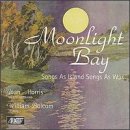| All Artists: Oley Speaks, Percy Wenrich, Joe / Emerson, Ida Howard, James / Paley, Herman Kendis, Gus Edwards, James Reese Europe, Raymond Hubbell, J. Rosamond Johnson, Henry W. Petrie, W.C. Handy, George M. Cohan, Jaan / Kellette, John Kenbrovin, Caro Roma, Victor Herbert, A. Baldwin Sloane, Fred Gilbert, Silvio Hein, Harry Dacre, Carrie Jacobs Bond, Michael Nolan Title: Moonlight Bay: Songs As Is and Songs As Was Members Wishing: 3 Total Copies: 0 Label: Albany Records Release Date: 2/9/1999 Genres: Special Interest, Pop, Soundtracks, Classical Styles: Vocal Pop, Opera & Classical Vocal, Forms & Genres, Concertos Number of Discs: 1 SwapaCD Credits: 1 UPC: 034061031826 |
Search - Oley Speaks, Percy Wenrich, Joe / Emerson, Ida Howard :: Moonlight Bay: Songs As Is and Songs As Was
 | Oley Speaks, Percy Wenrich, Joe / Emerson, Ida Howard Moonlight Bay: Songs As Is and Songs As Was Genres: Special Interest, Pop, Soundtracks, Classical
|
Larger Image |
CD Details |
CD ReviewsJoan Morris and William Bolcom return to their roots 03/13/1999 (5 out of 5 stars) "Back in 1974, mezzo-soprano Joan Morris, and her husband, William Bolcom, recorded "After the Ball," a collection of turn-of-the-century popular songs, some of which hadn't been recorded since the early part of the century, if ever. Now, after bringing their talents to the music of Jerome Kern, Cole Porter, Rodgers and Hart, and most recently, Vincent Youmans, they return to the turn of the century with this delightful collection. Note: no compromises were made with the original turn-of-the-century lyrics; this CD is not for those obsessed with "political correctness." But then, those obsessed with political correctness generally don't have much taste, anyway." A great addition John A. Jones | Los Angeles, CA USA | 08/19/2005 (4 out of 5 stars) "Joan Morris and her husband, composer William Bolcom, take another trip back to the early days of Broadway musicals and earlier. In the same groove as their earlier albums, After the Ball and Vaudeville. A great addition to your collection if you love this kind of music, performed the way it was meant to be heard." Turn Back the Calendar: Charming Stage & Parlor Songs Gary F. Taylor | Biloxi, MS USA | 05/08/2009 (5 out of 5 stars) "Mezzo-soprano Joan Morris and pianist William Bolcom have made a specialty of "period" songs. The 1974 Grammy-nominated AFTER THE BALL may well be their best known recording, but my own preference is for the 1999 MOONLIGHT BAY, SONGS AS IS AND SONGS AS WAS. While I continue to find Morris' voice a bit overstudied, it has a freer quality on this particular release, and I find the selections somewhat more pleasing.
The earliest selection is from 1881, and the time span ends at 1919 with several selections. Many of the songs are drawn from popular musical plays of the period--George M. Cohan is well-represented--and more than a few were famous on the Vaudeville circuit; all, however, were extremely popular in the front parlor, where parties of the day frequently drew expert pianists and singers to the piano. Particularly popular were a type of song commonly called "coon songs"--songs which were performed in the African-American dialect of the time, with "Hello, Ma Baby" a classic of its kind. While such songs are considered well beyond the pale by modern standards, Morris and her pianist husband William Bolcom perform them with such expertese that is possible to hear them with innocent ears and appreciate (if not actually approve) their charm. I must confess a great personal dislike of the song "The Road to Mandalay," an overly-dramatic piece drawn from a poem by Rudyard Kipling, but this aside I find a host of almost forgotten yet still familar tunes, ranging from such tavern favorites as "Heaven Will Protect The Working Girl" and "My Gal Sal" to the elegant "Poor Butterfly" and the nostalgic "Little Annie Rooney" and "School Days." I must confess my own favorite is the 1892 "Daisy Bell," which is better known as "A Bicycle Built for Two." But regardless of the title, each piece is beautifully performed. The combination of a single voice and single piano, particularly when both are so formal in nature and when each selection is stylistically similar--well, it becomes somewhat wearing when heard at length. Charming as the recording is, it is perhaps best heard in small doses. Even so, recommended. GFT, Amazon Reviewer" |

 Track Listings (24) - Disc #1
Track Listings (24) - Disc #1